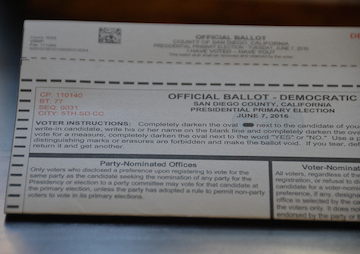Nearly 2 Million California Ballots Remain Uncounted, and the Number Could Grow
Many counties last reported their uncounted ballots days before the June 10 cutoff, keeping alive Bernie Sanders supporters' hopes that he will beat Hillary Clinton in the Golden State. A 2016 Democratic primary ballot for San Diego. (Rob Bertholf / C.C. 2.0)
A 2016 Democratic primary ballot for San Diego. (Rob Bertholf / C.C. 2.0)
A 2016 Democratic primary ballot for San Diego. (Rob Bertholf / C.C. 2.0)
In the days following California’s primary, reports began to surface that millions of ballots had yet to be counted. More than a week after the June 7 election, a reported 1.9 million ballots remain uncounted, giving Bernie Sanders supporters reason to hope he can beat Hillary Clinton in the liberal Golden State.
Additionally, all California counties can receive ballots until June 10 (three days after the primary). Looking at the latest numbers, many counties last reported on June 8 or 9—before the cutoff date to receive more ballots.
Take, for example, San Diego County. It last reported a total of 285,000 ballots on June 8, and the number hasn’t been officially updated since. In fact, of the 58 counties in California, 34 counties’ most recent numbers were reported before June 10. Who knows how many more ballots may arrive and add to the current 1.9 million uncounted ballots before the June 10 cutoff.
But why so many uncounted votes? The Washington Post explains:
Like the rest of the Pacific coast states, California has moved toward mail-in balloting and built a system that encourages turnout but takes weeks to fully count. On election night, when Hillary Clinton was declared the winner of the state’s primary, just 3.5 million ballots had been counted in the Democratic race and just 1.5 million had been counted in the basically uncontested GOP race. But according to Alex Padilla, California’s Democratic secretary of state, as many as 8.9 million ballots were cast. Millions of provisional ballots and absentee ballots, which could have been postmarked any time on Election Day, remained outstanding in a race decided by about 440,000 votes.
SFGate.com adds that the turnout (49 percent of California’s registered voters) is one of the state’s highest, although it remains lower than the “historic 57.7 percent turnout in 2008.”
The vote-counting—and the support for Sanders’ campaign—is continuing despite a controversial report issued by The Associated Press the night before the California primary. At that time, the AP announced that Hillary Clinton had garnered enough superdelegate support to ensure she would be Democratic Party’s nominee. This breaking news outraged many, who accused the AP of potentially “suppressing voter turnout,” writes truth-out.org. “Such media interference only fosters overall distrust and the conviction that powerful networks are aligned with Clinton and manipulating in her favor.”
Although a Sanders win in California would not push him into a delegate lead over Clinton, it would send a powerful message to the Clinton campaign; that is, that one of the most progressive, historically Democratic states in the nation doesn’t favor her as nominee. Considering that Sanders is also hoping to influence the party platform at the Democratic National Convention this summer, the momentum from a California win would bolster him.
—Posted by Emma Niles
Your support matters…Independent journalism is under threat and overshadowed by heavily funded mainstream media.
You can help level the playing field. Become a member.
Your tax-deductible contribution keeps us digging beneath the headlines to give you thought-provoking, investigative reporting and analysis that unearths what's really happening- without compromise.
Give today to support our courageous, independent journalists.






You need to be a supporter to comment.
There are currently no responses to this article.
Be the first to respond.